
How soon until we get a Google News “Plus Your World?”
With the introduction of the oddly extraterrestrial-sounding Google “Search Plus Your World”, the company proclaimed their latest experiment is “transforming Google into a search engine that understands not only content, but also people and relationships.” The world of search gets split up and re-filtered through the things Google knows you like and information from the people around you.
Now, since the announcement there’s been much controversy over how “the things Google knows you like” seems to be driven almost entirely by Google+, not larger competitors Facebook and Twitter, which has led to cries for an antitrust inquiry. But let’s set that aside for a moment and think about what the underlying idea of Search Plus Your World could mean for Google News.
Here’s what we know of how Search Plus Your World works:
1. Personal Results, which enable you to find information just for you, such as Google+ photos and posts—both your own and those shared specifically with you, that only you will be able to see on your results page;
2. Profiles in Search, both in autocomplete and results, which enable you to immediately find people you’re close to or might be interested in following; and,
3. People and Pages, which help you find people profiles and Google+ pages related to a specific topic or area of interest, and enable you to follow them with just a few clicks. Because behind most every query is a community.
Let’s say you were interested in Republican frontrunner Mitt Romney. Taking the normal route through Google News, you’d most likely try searching for “mitt romney” or click on the newly added Elections header and get links to stories from usual suspects like USA Today, The Wall Street Journal, The New York Times, and more.
If you dropped a “Search Plus” layer to that, what might you expect? If your Google+ friends are sharing stories about Romney, they might get shoved to the top. That would likely mean they’d be more closely aligned to your friends’ political perspectives; your liberal friends are probably sharing anti-Romney pieces, your conservative ones pro-Romney ones. (Well, unless they’re conservatives who don’t like Romney, but that’s another issue.) You might also see individual Google+ pages from Romney, other G.O.P. candidates — and maybe even the G+ pages of individual reporters who are covering the campaign and writing some of the stories you’re being shown.
That probably sounds a little familiar to what we’ve come accustom to seeing on Twitter and Facebook. But neither of those sites is fueled by the same combination of search and network. Twitter search looks at everybody’s tweets; Facebook’s news feed just flows on by, driven by Facebook’s algorithms rather than your search interests. Google has the search DNA, the news-crawling infrastructure, and at least the start of the network knowledge that could combine to make something new.
Those are pretty powerful assets and remain the reason Google still inspires animosity in some news executives and antitrust lawyers. A Google News Plus Your World (let’s call it “Google News+” for the sake of brevity) could in theory provide users a social news service that (whether they like it or not) knows about their browsing habits and social graph while also filtering “news” product out of the larger mass of the web.
Google News already provides tools for customization, but most (though not all) rely on users’ being interested in fiddling — yes to business, no to entertainment, more Wall Street Journal, less Cat Fancy. The genius of the social news feed is that it bases those decisions off of network data. You just need to build a network.
But let’s stretch the speculation just a bit further: the toggle. One of the more clever aspects of Search Plus is the ability to shift back and forth between normal and personalized search with one little switch. The toggle is a way to dodge the backlash that comes when any product is seemingly irreversibly redesigned (and built on seemingly self-serving decisions of the sort that gets lawyers involved).
For a notional Google News+, that little switch would be a dividing line for readers between the fire hose and a curated feed. It could also be, as Steven Levy points out over at Wired, the pin that pops Eli Pariser’s Filter Bubble. That kind of freedom, to jump back and forth between the personalized feed and the raw stream, is not common on news sites. The toggle is a promise of serendipity, but also the comfort of your favorite, trusted news service, which, if you are someone still mourning the transformation of Google Reader, could harken back to glory days of the RSS service.
One bit of groundwork is already laid for something like Google News+: the integration of journalists Google+ profiles into Google News. Connecting authorship to identity is an ongoing Google interest, beginning with the authorship markup language that spotlighted writers in search results. As Google tries to integrate social into every corner of their business, a fully social-fied Google News would seem like a logical next step.